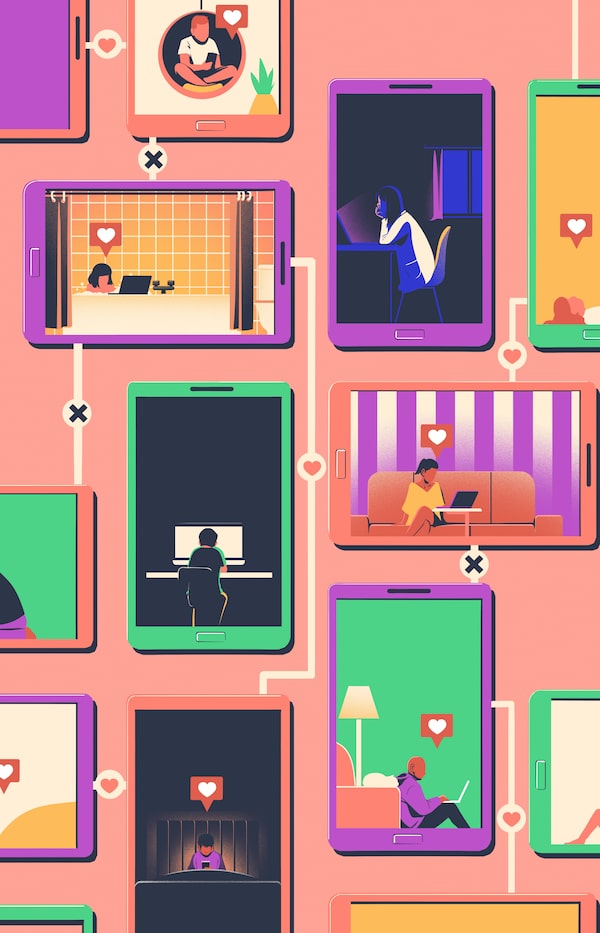
Illustration by Eric Chow
For a self-described “relationship person,” it’s been a long time since 25-year-old Vanshika Dhawan has been in one. She had been seeing someone long-distance before the COVID-19 pandemic began in earnest in March, 2020, but they broke up not long after that. Starting to date again has been difficult.
“For the first six or seven months of the pandemic, dating was terrifying,” says Dhawan, who was hesitant to even see her friends in parks. “And then in late 2020 and early 2021, I went on a few dates, but it just felt so lackluster. I wasn’t enjoying myself and there was all this anxiety because I didn’t know how careful they were being and how they were approaching the pandemic.”
As it has with so many aspects of people’s lives, COVID-19 has thrown a curveball into the dating adventures of singles. Many, such as Dhawan, have struggled. But for others, the past two years have clarified what they wanted, inspiring them to prioritize romantic relationships in ways they hadn’t before. It’s still too soon to know what the long-term effects of COVID-19 will be on romance, says Danu Stinson, an associate professor of psychology at the University of Victoria and the director of the school’s Self and Well-Being Lab, but “we’re going to see that there were really widespread and pervasive effects of these social changes on people’s dating behaviour.”
One of the biggest trends to emerge over the past two years is what’s been termed “intentional dating.”
“Before the pandemic, people were busy. They might have thought about dating or gone on dates, but many thought, ‘love is something that will happen to me; I don’t need to proactively put effort into it,’” says Logan Ury, director of relationship science for dating app Hinge. “Then when the pandemic hit, people had a lot of time alone to think, ‘Who am I? What do I want?’ We saw that people actually did a lot of internal thinking about their priorities – and they also realized it had become much harder to date, so it was no longer something that they took for granted.”
Ury says people put more effort into dating and ghosting dropped by 27 per cent, according to surveys sent to users. The app even saw a new trend emerge over the past two years, something they call “hard balling,” where people communicate what they are looking for in a relationship very early on – even on the first date – and are willing to walk away if their potential partner isn’t on the same page.
Similar dynamics played out on other dating apps. Bumble users, for example, are also searching “for potential partners that share similar dating intentions before beginning a conversation,” says Clare O’Connor, the app’s head of editorial, who notes that more than one billion Bumble matches were made in 2021, up 25 per cent from the previous year. Users sent nine billion messages, an increase of nearly 40 per cent from 2020.
Early in the pandemic, the big thing was “corona cuffing,” and news media shared lockdown love stories about people who embarked on serious relationships – and even cohabitation – after a relatively short period of time.
That trend has continued, and for good reason, says Saunia Ahmed, a clinical psychologist and relationship counsellor in Toronto. “People are hardwired for social contact; it is in our DNA. When we don’t have that interaction, particularly good quality, in-person interaction, we are more prone to feeling hopeless and depressed,” she says.
That sense of isolation can also lead to the exact opposite move, however, with people simply giving up on love for the time being. “I find that people’s approach to dating has changed,” Ahmed says. “Some people decided they can’t do online dating and will just wait until things open up. They’re just exhausted and tired.”
That’s where Dhawan finds herself these days. She does struggle with loneliness, she says, but finds it difficult to connect with people on apps, and doesn’t love the idea of building a relationship solely online.
“As time went on, even as we got our vaccinations, the act of talking to people on dating apps felt like too much effort for something that most likely wasn’t going to pan out. And I know that that’s the case all the time, even when we’re not in a pandemic. But it just feels like the chances of things panning out are so much lower that it’s not even worth it.”
Ana Maria Leal, who’s 27, agrees. She also broke up with her partner right before the pandemic started and spent most of the next two years living with her parents in London, Ont. She tried dating apps, but “it seemed illogical to continue to talk to guys who I couldn’t meet,” she says. Instead, she ended up having a friends-with-benefits relationship with a former schoolmate that has since ended.
“It was good in the moment but not completely satisfactory,” she says. “Dating is supposed to be natural and organic, but during the pandemic it takes a lot of energy and effort.”
Leal says she’s not on any apps right now, but she is open to dating if she meets someone in real life.
“I recently went to Miami and met a lot of great people, which reminded me about how it feels to meet someone organically,” she says. “I am hoping to have more of those experiences.”
Sign up for the weekly Parenting & Relationships newsletter for news and advice to help you be a better parent, partner, friend, family member or colleague.